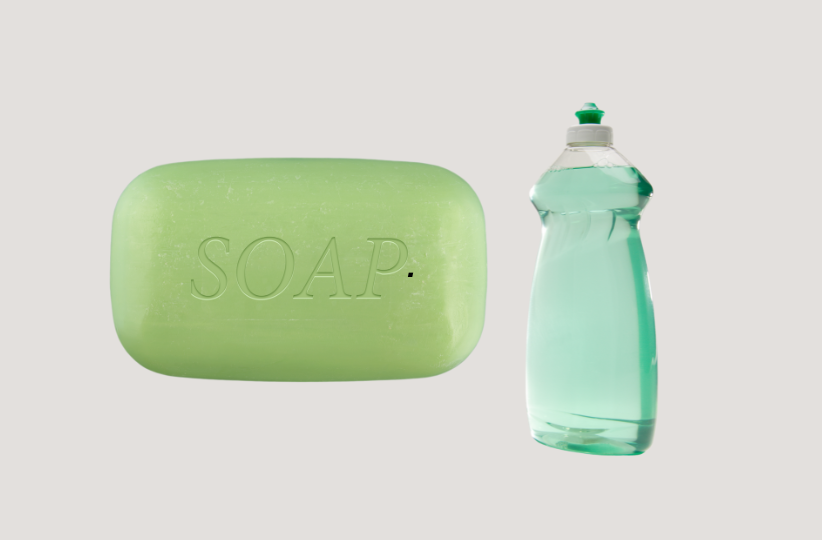
Soap V Detergent
Analisa MaloneEven though the words Soap & Detergent are thrown around together - they are rather different. We need to stop using detergents full stop - they are not good for the environment or ourselves. So, we need to know what a detergent really is & what other options we have & that's what this article is about!
First – some science
To make sure you get the full picture, I need to start with some cool science stuff about Surfactants – as this is the thing that Soaps & Detergents have in common.
Surfactants play an important function in cleaning as they trap and suspend the dirt/oil so it’s easy to remove when you rinse. Some common surfactants are Sodium Lauryl Sulfate (SLS), Alcohol Ethoxylate (AE) & you guessed it good old Soap.
Mostly all surfactants need to be produced, a chemical process needs to be undertaken like saponification (for soap) or oxo synthesis (for SLS) & there needs to be ingredients to kick off the whole process.
Option 1 – Pure Soap
Soap is the earliest known surfactant & is made from mixing animal or vegetable fats with a strong alkali called lye.
There is a legend that Soap gets in name from Mount Sapo in Italy – the top homing an altar where they used to sacrifice animals to the Gods. The women washed clothing in the river below & claimed it was blessed with some ability to clean better.
Legend has it as the fats from the animals combined with the ashes ran down the river, forming the first ever known ‘soap’.
Soap can be made using different natural fats/oils but for it to be a true soap it must undergo the saponification process caused by lye. If it is not made from fats & lye then it's not actually a soap, it's a detergent.
- Made from natural ingredients
- History dating 2800BC
- Biodegradable
- Safer on septics/ waterways
- Can be expensive to make
- Not as effective in hard water
- Can produce soap scum
- Mild/ moderate cleaning powe
WHAT IS LYE?
Lye is basically a very strong alkaline it’s extremely caustic and care needs to be taken when handling. You can make your own version using ashes. It comes in two forms sodium hydroxide used for hard soap like our Organic Coconut Soap or potassium hydroxide used for liquid soaps like our Castile Soap.
There is no substitute for lye, nothing else will make oil become soap. All the lye is converted in the saponification process and there should not be residual left over in a good quality soap.
Option 2 – detergents
The production of more powerful surfactants and detergents became popular during war, when it was harder to access the oils/fats to make soap. They also were looking for solutions that were better in hard & cold water.
Over the last 100 years many chemical companies have jumped on board producing a huge array of surfactants - making this a $65 billion a year industry.
- Made from synthetic ingredients
- Just over 100 years old
- Not expensive to make
- Not biodegradable
- Effective in hard water
- Does not produce soap scum
- Harmful to waterways/aquatic life
- Moderate/Strong cleaning power
- The stronger it is the harsher it is
Unlike Soap, which has lasted the test of time, we are only now seeing the health & environmental impact of these stronger, yet harsher detergents pumped out by these corporations.
Phosphates is a prime example - they lifted the bar when it came to cleaning efficiency & made life more convenient. However, decades later phosphates are a known killer of the aquatic ecosystem & cause of severe algae blooms.
Your Choice
For truly green cleaning solutions we need to ditch ALL detergents & use soap as our main cleaning ingredient. Unfortunately, this means eliminating virtually everything you find in the supermarket cleaning isle, as they are all detergents of some sort - even those that claim to be 'green'.
Although soap may not be as foamy & strong as other detergents, it has the least impact on the waterways, aquatic life, environment & our health. And with a bit of science, we can make our soap work hard & be more effective.
You can learn more about soap or grab some quality soaps for your toolkit right here at Under Your Sink.
Thanks for reading and Happy Green Cleaning!
